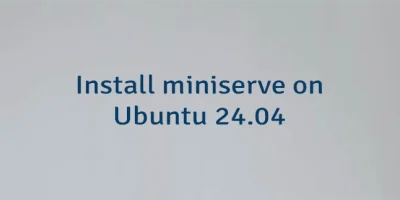Tokei is a command line tool for counting blank lines, comment lines, and physical lines of source code. Results are displayed in the table. Tokei supports various programming languages.
This tutorial demonstrates how to install Tokei on Ubuntu 20.04.
Install Tokei
Execute the following command to download tar.gz file from releases page of the Tokei repository:
sudo wget -qO tokei.tar.gz https://github.com/XAMPPRocky/tokei/releases/latest/download/tokei-x86_64-unknown-linux-gnu.tar.gzExtract a tar.gz file to /usr/local/bin directory.
sudo tar xf tokei.tar.gz -C /usr/local/binNow tokei command can be used for all users.
We can check Tokei version:
tokei --versionRemove unnecessary tar.gz file:
rm -rf tokei.tar.gzTesting Tokei
Create a main.c file for testing:
nano main.cAdd the following code:
#include <stdio.h>
// Hello world program
int main() {
printf("Hello world\n");
return 0;
}Now run tokei command to count lines of code:
tokei main.cCommand will print the following results:
===============================================================================
Language Files Lines Code Comments Blanks
===============================================================================
C 1 8 5 1 2
===============================================================================
Total 1 8 5 1 2
===============================================================================We can provide directory as argument for tokei command. It will analyze a given directory and all subdirectories. For example, download the Tokei source code from GitHub:
wget -qO tokei-master.tar.gz https://github.com/XAMPPRocky/tokei/archive/master.tar.gz
tar xf tokei-master.tar.gzRun tokei command to analyze given directory:
tokei tokei-masterUninstall Tokei
If Tokei is no longer needed, you can remove executable file:
sudo rm -rf /usr/local/bin/tokei



Leave a Comment
Cancel reply